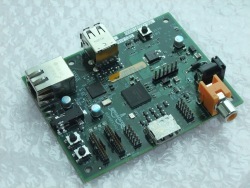Raspberry Pi warms up

![]() Raspberry Pi Model B Alpha board
Raspberry Pi Model B Alpha board
Source: Raspberry Pi Foundation
The volunteers of the Raspberry Pi project have, with the arrival and demonstration of the first alpha "Model B" boards, moved another step closer to their vision of creating an ARM-based, low-cost computer for education. The Raspberry Pi computer now has two models, and the "Model B" board being shown has changed somewhat from its previous appearance, losing the "USB stick" styling in favour of a more traditional rectangular board – the size of a credit card but with lots of space for mounting I/O ports. The board is based around the Broadcom BCM2835, a 700 Mhz "application processor", and over the last month the developers have been putting it through its paces. First they showed a demo of Quake 3 running on the Pi:
Quake 3, Raspberry Pi style
And then at TransferSummit, the developers showed the h.264 1080p video playback capability:
Playing back h264 1080p video on the Raspberry Pi (Source: http://andypiper.co.uk/)
Plans for the release of the device are being developed; Model A and B versions of the Raspberry Pi, costing $25 (just over £15) and $35 (just over £22), are hoped to be available by November. The Model A will have 128 MB of SDRAM while the Model B will have 256 MB. One USB 2.0 port will be available on the model A, whereas the Model B will have a 2-port USB hub and a 10/100 Ethernet controller. HDMI and composite video output on both models will be complemented with an SD/MMC/SDIO capable memory card slot and general purpose I/O and other interfaces brought out to 1.27 mm pin-strip. Keyboards, mice and other peripherals can be connected over the USB. More details about the hardware can be found on elinux.org.
Decisions about the overall openness of the Raspberry Pi are yet to be made though; there are binary blobs used by the GPU, and the Linux drivers built so far are closed user-space drivers linked from the kernel. The position on these elements is in the hands of Broadcom who is building the chip, but they are common issues faced by small ARM-based FOSS projects which involve chips with proprietary GPUs.
Once the project is shipping hardware, the plan is to create more software for the device, and to promote it to UK educators as a platform for teaching computing. The developers aim to have Debian, Fedora and ArchLinux available from the start – plans for Ubuntu support have had to be put to one side because, they say, "of issues with newer releases of Ubuntu and the ARM processor we are using".
(djwm)
![Kernel Log: Coming in 3.10 (Part 3) [--] Infrastructure](/imgs/43/1/0/4/2/6/7/2/comingin310_4_kicker-4977194bfb0de0d7.png)

![Kernel Log: Coming in 3.10 (Part 3) [--] Infrastructure](/imgs/43/1/0/4/2/3/2/3/comingin310_3_kicker-151cd7b9e9660f05.png)
















